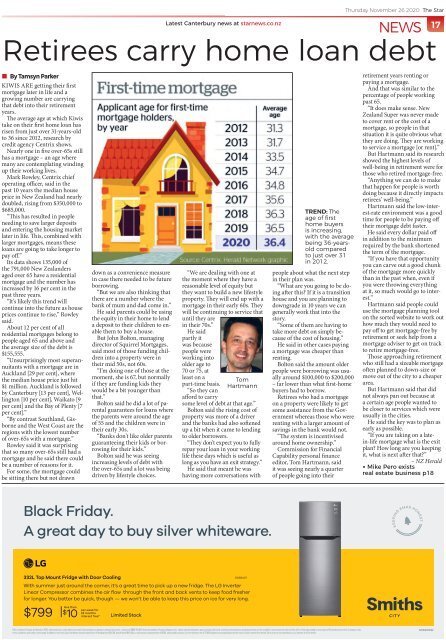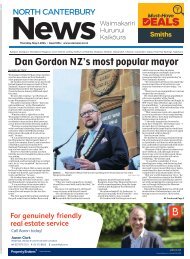The Star: November 26, 2020
You also want an ePaper? Increase the reach of your titles
YUMPU automatically turns print PDFs into web optimized ePapers that Google loves.
Latest Canterbury news at starnews.co.nz<br />
Thursday <strong>November</strong> <strong>26</strong> <strong>2020</strong> <strong>The</strong> <strong>Star</strong><br />
NEWS 17<br />
Retirees carry home loan debt<br />
• By Tamsyn Parker<br />
KIWIS ARE getting their first<br />
mortgage later in life and a<br />
growing number are carrying<br />
that debt into their retirement<br />
years.<br />
<strong>The</strong> average age at which Kiwis<br />
take on their first home loan has<br />
risen from just over 31-years-old<br />
to 36 since 2012, research by<br />
credit agency Centrix shows.<br />
Nearly one in five over-65s still<br />
has a mortgage – an age where<br />
many are contemplating winding<br />
up their working lives.<br />
Mark Rowley, Centrix chief<br />
operating officer, said in the<br />
past 10 years the median house<br />
price in New Zealand had nearly<br />
doubled, rising from $350,000 to<br />
$685,000.<br />
“This has resulted in people<br />
needing to save larger deposits<br />
and entering the housing market<br />
later in life. This, combined with<br />
larger mortgages, means these<br />
loans are going to take longer to<br />
pay off.”<br />
Its data shows 135,000 of<br />
the 791,000 New Zealanders<br />
aged over 65 have a residential<br />
mortgage and the number has<br />
increased by 16 per cent in the<br />
past three years.<br />
“It’s likely this trend will<br />
continue into the future as house<br />
prices continue to rise,” Rowley<br />
said.<br />
About 12 per cent of all<br />
residential mortgages belong to<br />
people aged 65 and above and<br />
the average size of the debt is<br />
$155,555.<br />
“Unsurprisingly most superannuitants<br />
with a mortgage are in<br />
Auckland [29 per cent], where<br />
the median house price just hit<br />
$1 million. Auckland is followed<br />
by Canterbury [13 per cent], Wellington<br />
[10 per cent], Waikato [9<br />
per cent] and the Bay of Plenty [7<br />
per cent].”<br />
“By contrast Southland, Gisborne<br />
and the West Coast are the<br />
regions with the lowest number<br />
of over-65s with a mortgage.”<br />
Rowley said it was surprising<br />
that so many over-65s still had a<br />
mortgage and he said there could<br />
be a number of reasons for it.<br />
For some, the mortgage could<br />
be sitting there but not drawn<br />
down as a convenience measure<br />
in case there needed to be future<br />
borrowing.<br />
“But we are also thinking that<br />
there are a number where the<br />
bank of mum and dad come in.”<br />
He said parents could be using<br />
the equity in their home to lend<br />
a deposit to their children to enable<br />
them to buy a house.<br />
But John Bolton, managing<br />
director of Squirrel Mortgages,<br />
said most of those funding children<br />
into a property were in<br />
their mid 50s, not 60s.<br />
“I’m doing one of those at the<br />
moment, she is 67, but normally<br />
if they are funding kids they<br />
would be a bit younger than<br />
that.”<br />
Bolton said he did a lot of parental<br />
guarantees for loans where<br />
the parents were around the age<br />
of 55 and the children were in<br />
their early 30s.<br />
“Banks don’t like older parents<br />
guaranteeing their kids or borrowing<br />
for their kids.”<br />
Bolton said he was seeing<br />
increasing levels of debt with<br />
the over-65s and a lot was being<br />
driven by lifestyle choices.<br />
“We are dealing with one at<br />
the moment where they have a<br />
reasonable level of equity but<br />
they want to build a new lifestyle<br />
property. <strong>The</strong>y will end up with a<br />
mortgage in their early 60s. <strong>The</strong>y<br />
will be continuing to service that<br />
until they are<br />
in their 70s.”<br />
He said<br />
partly it<br />
was because<br />
people were<br />
working into<br />
older age to<br />
70 or 75, at<br />
least on a<br />
part-time basis.<br />
“So they can<br />
afford to carry<br />
Tom<br />
Hartmann<br />
some level of debt at that age.”<br />
Bolton said the rising cost of<br />
property was more of a driver<br />
and the banks had also softened<br />
up a bit when it came to lending<br />
to older borrowers.<br />
“<strong>The</strong>y don’t expect you to fully<br />
repay your loan in your working<br />
life these days which is useful as<br />
long as you have an exit strategy.”<br />
He said that meant he was<br />
having more conversations with<br />
TREND: <strong>The</strong><br />
age of first<br />
home buyers<br />
is increasing,<br />
with the average<br />
being 36-yearsold<br />
compared<br />
to just over 31<br />
in 2012.<br />
people about what the next step<br />
in their plan was.<br />
“What are you going to be doing<br />
after this? If it is a transition<br />
house and you are planning to<br />
downgrade in 10 years we can<br />
generally work that into the<br />
story.<br />
“Some of them are having to<br />
take more debt on simply because<br />
of the cost of housing.”<br />
He said in other cases paying<br />
a mortgage was cheaper than<br />
renting.<br />
Bolton said the amount older<br />
people were borrowing was usually<br />
around $100,000 to $200,000<br />
– far lower than what first-home<br />
buyers had to borrow.<br />
Retirees who had a mortgage<br />
on a property were likely to get<br />
some assistance from the Government<br />
whereas those who were<br />
renting with a larger amount of<br />
savings in the bank would not.<br />
“<strong>The</strong> system is incentivised<br />
around home ownership.”<br />
Commission for Financial<br />
Capability personal finance<br />
editor, Tom Hartmann, said<br />
it was seeing nearly a quarter<br />
of people going into their<br />
retirement years renting or<br />
paying a mortgage.<br />
And that was similar to the<br />
percentage of people working<br />
past 65.<br />
“It does make sense. New<br />
Zealand Super was never made<br />
to cover rent or the cost of a<br />
mortgage, so people in that<br />
situation it is quite obvious what<br />
they are doing. <strong>The</strong>y are working<br />
to service a mortgage [or rent].”<br />
But Hartmann said its research<br />
showed the highest levels of<br />
well-being in retirement were for<br />
those who retired mortgage-free.<br />
“Anything we can do to make<br />
that happen for people is worth<br />
doing because it directly impacts<br />
retirees’ well-being.”<br />
Hartmann said the low-interest-rate<br />
environment was a good<br />
time for people to be paying off<br />
their mortgage debt faster.<br />
He said every dollar paid off<br />
in addition to the minimum<br />
required by the bank shortened<br />
the term of the mortgage.<br />
“If you have that opportunity<br />
you can carve out a good chunk<br />
of the mortgage more quickly<br />
than in the past when, even if<br />
you were throwing everything<br />
at it, so much would go to interest.”<br />
Hartmann said people could<br />
use the mortgage planning tool<br />
on the sorted website to work out<br />
how much they would need to<br />
pay off to get mortgage-free by<br />
retirement or seek help from a<br />
mortgage adviser to get on track<br />
to retire mortgage-free.<br />
Those approaching retirement<br />
who still had a sizeable mortgage<br />
often planned to down-size or<br />
move out of the city to a cheaper<br />
area.<br />
But Hartmann said that did<br />
not always pan out because at<br />
a certain age people wanted to<br />
be closer to services which were<br />
usually in the cities.<br />
He said the key was to plan as<br />
early as possible.<br />
“If you are taking on a latein-life<br />
mortgage what is the exit<br />
plan? How long are you keeping<br />
it, what is next after that?”<br />
– NZ Herald<br />
• Mike Pero exists<br />
real estate business p18<br />
Black Friday.<br />
A great day to buy silver whiteware.<br />
332L Top Mount Fridge with Door Cooling<br />
9058437<br />
With summer just around the corner, it’s a great time to pick up a new fridge. <strong>The</strong> LG Inverter<br />
Linear Compressor combines the air flow through the front and back vents to keep food fresher<br />
for longer. You better be quick, though — we won’t be able to keep this price on ice for very long.<br />
$799<br />
less than<br />
$10<br />
per week for<br />
24 months<br />
interest free*<br />
Limited Stock<br />
Offers valid until Tuesday 1st December <strong>2020</strong>, while stocks last, unless otherwise stated. Some products on display in selected stores only – please call 0800 764 847 to check availability. Personal shoppers only. *Apple, selected computers, game consoles, gift cards, clearance items and some promotional items are not available in conjunction with interest free offers. Flooring available on a maximum of 18 months interest free. Exclusions, fees,<br />
terms, conditions, and credit criteria apply. Available in-store only. Equal instalment amounts include one-off booking fee of $45.00, annual fees of $45.00 p.a. and security registration fee of $8.05, and exclude insurance. Current interest rate of 23.95% applies to any unpaid balance after expiry of (any) interest free period. See in-store or visit smithscity.co.nz/interest-free for details.<br />
SCWK31CS2


















